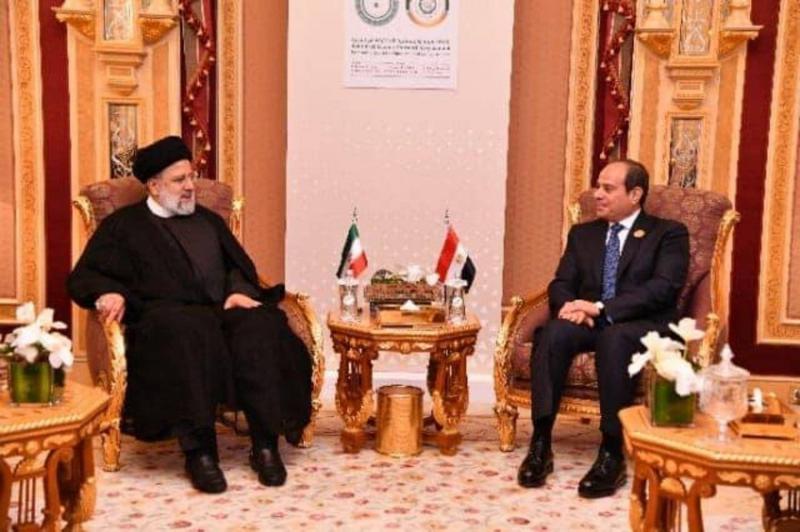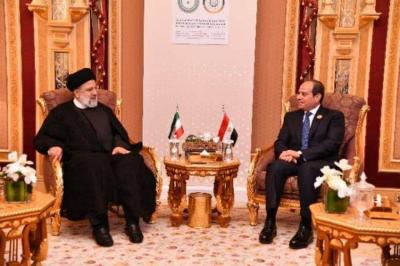The Iranian and Egyptian peoples, as well as the populations of the region, are keen on any developments regarding the resumption of relations between Iran and Egypt, especially when indications of progress in addressing this relationship arise. Following a meeting between Iranian Foreign Minister Hossein Amir-Abdollahian and his Egyptian counterpart Sameh Shoukry on the sidelines of a gathering of Islamic leaders in Gambia, the possibility of normalizing relations between Iran and Egypt was once again brought up. A spokesperson for the Egyptian Foreign Ministry stated about this meeting: "After previous communications and meetings between the two ministers, as well as recommendations from the leaderships of both countries, the meeting discussed the pace of bilateral relations, and the two sides agreed to continue consultations to resolve and address all outstanding issues in order to restore relations."
However, what are the obstacles to normalizing relations? The relationship between Iran and Egypt has undergone many developments. The Iranian regime adopted hostility towards Egypt after it hosted the former Shah of Iran in 1979. Later, the regime named a street in Tehran after Khaled Islamy, who was involved in the assassination of former Egyptian President Anwar Sadat, in 1980, which heightened tensions between the two countries. Both countries have made numerous attempts to restore relations, but these efforts have not succeeded.
The relations have not reached normalization despite the approval of the regime's leader, Ali Khamenei. Relations between the two countries have not normalized during the presidencies of Mohammad Khatami, Mahmoud Ahmadinejad, or Ebrahim Raisi. In 1991, both countries agreed on appointing charge d'affaires in both nations after 11 years of severed ties. Despite all the political disagreements between the two countries over the past four decades, there have been opportunities for joint relations. During the Syrian people's protests against Bashar al-Assad's regime, while all Arab countries severed their ties with the Syrian government and closed their embassies in Damascus, Egypt did not close its embassy. Egypt was one of the few countries that supported Assad's regime, similar to the Iranian regime.
Currently, both Iran and Egypt are experiencing difficult economic conditions, but the people in both historical nations have a desire for travel and tourism development. Visiting the shrine of the eighth Imam for Shiites in Mashhad, as well as his sister in Qom, are among the places about two million Shiites in Egypt wish to visit. On the other hand, the existence of the tomb of former Shah Mohammad Reza Pahlavi in the Al-Rifai Mosque in Cairo could become one of the primary attractions for Iranians traveling to Cairo.
However, aside from security challenges that pose risks to Iranian tourists due to the Iranian regime, the strong desire of Iranians to visit the late Shah’s tomb in Egypt is undeniable. The Iranian regime needs to normalize its relations with Islamic countries to break free from the isolation caused by the behavior of the regime's leaders. This need was demonstrated by the resumption of relations with Saudi Arabia. These efforts and the outcomes of restoring relations were linked to Saudi Vision 2030 and the future development plan for 2050. Saudi Arabia and all the countries in the region, which have linked their growing economies to this project, need to find security stability in their markets, hence they agreed to restore relations with the Iranian regime.
The resumption of ties between Tehran and Cairo is partly due to resolving old disputes and partly to the restoration of relations between Riyadh and Tehran. The issue of the war in Gaza was one of the main topics discussed in the bilateral talks, but the issue of the Houthis is of significant importance to Egypt alongside the concerns related to the Gaza war. Since the Iranian-backed Houthis have begun campaigns against maritime navigation heading to Israel, these actions, rather than harming the Israeli economy or posing a threat, have caused damage to Egypt. Some commercial ships have altered their routes and now head to the furthest points in southern Africa instead of passing through the Red Sea and the Suez Canal, leading to significant losses for the Egyptian government and a marked decrease in Egypt’s revenue from Suez Canal crossing fees. Additionally, Houthi attacks have posed challenges for the future functioning of this strategic canal. Thus, it is reasonable that part of the discussions between Sameh Shoukry and Amir-Abdollahian addressed Egypt's discontent over maritime attacks in the Red Sea.
Furthermore, some Arab newspapers reported that Egypt seeks to purchase oil from Iran at reduced prices. Sanctions against Iran’s oil industry have led to the expansion of activities by major smugglers, and Iraq, as a partner of the Iranian regime, buys portions of Iranian oil at lower prices to sell in markets as Iraqi products. Therefore, it can be said that discussions between Iran and Egypt at this stage have focused on economic issues, as they have become a necessity for both countries, more than their interest in restoring bilateral relations.
Iran and Egypt have a long road ahead to normalize their relations, with the Egyptians viewing the resumption of ties between Saudi Arabia and Iran as a test for deciding on restoring relations between the two countries.




